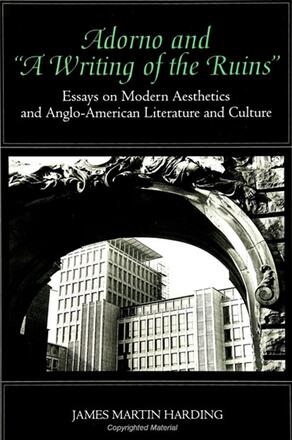
Adorno and "A Writing of the Ruins"
Essays on Modern Aesthetics and Anglo-American Literature and Culture
Alternative formats available from:
Extends critical discussion of Adorno to works by Samuel Beckett, T. S. Eliot, Ralph Ellison, and Amiri Baraka, arguing that Adorno's work can best be assessed in terms of its relevance in specific localized contexts.
Description
Arguing that postmodernism has so shifted current critical paradigms that Adorno's work can best be assessed in terms of its relevance in specific localized contexts, this book pursues a course that preserves Adorno's opposition to hegemonic programs but that is also wary of Adorno's own (negative) penchant for totalizing concepts. Unlike recent works which attempt to synthesize Adorno's writings into a comprehensive system that then becomes either the focus of an overriding critique or an object of appropriation, Harding orders his book as a collection of essays whose loose association questions the structural totality of Adorno's thought. Though together the essays cover all the major issues of Adorno's thought and offer a wide critical survey of his writings, the diversity of their focus avoids a systematic reduction of Adorno's work into a reproducible technique or method. The result of this strategy is a far more dynamic analysis of Adorno than a mere critical reconstruction of his ideas.
By applying Adorno's theories to works by Samuel Beckett, T. S. Eliot, Ralph Ellison, and Amiri Baraka, the book pushes critical discussion of Adorno into cultural contexts that, while perhaps new for Adorno scholars, reach out to those whose knowledge of Adorno is limited. This book is a fine introduction to the subtleties of Adorno's writing and a genuine contribution to Adorno scholarship.
James Martin Harding is Assistant Professor of English at Eastern Michigan University.
Reviews
"Harding presents a new and long overdue approach to Adorno's aesthetics in its attempt to apply some of his aesthetics and cultural theories to specific works. The author does this with great intelligence and insight. He also covers a wide range of topics, as Adorno's own writing does, from opera to jazz to African American literature. This range gives a strong test to Adorno's theoretical writing, which sometimes proves useful and sometimes not; the author deals sympathetically yet rigorously with those points at which Adorno's thought seems inadequately to account for the phenomena predicted by his own theories. " — Sandra Corse, Georgia Institute of Technology